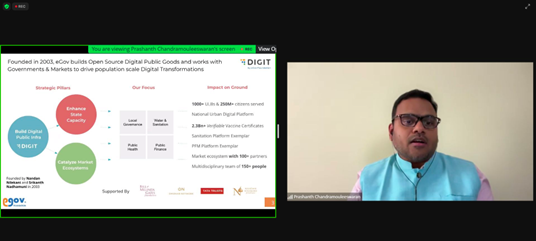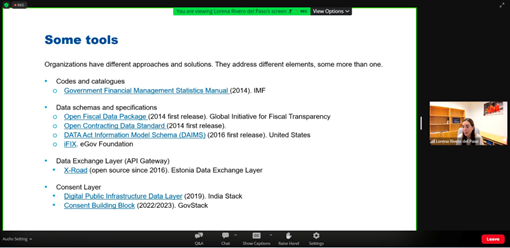The Digital Public Finance Hub hosted the first in its new BudgetBytes webinar series at the end of July. Here are our reflections from BudgetByte #1: ‘Can standards for fiscal data exchange support better service delivery?’
We would like to thank our partner the eGov Foundation for helping us to organise and facilitate this event. The eGov Foundation is a non-profit comprised of technologists, strategists and policy professionals that is committed to solving societal challenges in India.
Playback
First, a quick recap.
The event began with a high-level presentation on the challenges in standardisation that have plagued treasuries and line ministries across the globe. The rest of the webinar centred on the presentation of the iFIX approach to standardising fiscal events and was overseen by Prashanth Chandramouleeswaran, a Programme Manager at the eGov Foundation and the head of their public financial management (PFM) work.
Chandramouleeswaran explained how iFIX standardises formats and promotes real-time exchange by creating common ‘events’ for repeatable data-sharing that systems can recognise. These events can help accelerate the flow of fiscal data and information in a way that is timely, comprehensive and comprehensible, while the standardisation also ensures interoperability between agencies.
We also heard the reflections of experts from around the globe on whether the iFIX approach could have broader applicability beyond India. These voices included Harish Srivastava, Joint Controller General in the Department of Expenditure in the Indian Ministry of Finance; Tohurul Hasan, a Digital Financial Services Specialist at a2i Bangladesh; David Savage, Head Official for the Western Cape Provincial Treasury in South Africa; and Lorena Rivero del Paso, a Public Financial Management Advisor at the International Monetary Fund (IMF).
What did we learn?
The panel discussion was wide-ranging, but three key themes stood out during the discussion.
1. Standards are not universal
Our panellists spoke to the continued differences in how data is structured across the different geographies they operate in, including South Asia, Africa and Latin America. While the standardisation offered by iFIX was universally regarded as promising, the nomenclature, structures, event types and transaction stages people use to standardise data vary widely.
Lorena Rivero del Paso noted that while the idea of structuring data and standardising fiscal events based on stages of the transaction is relatively common in Latin America, it is not always common in other contexts. She mentioned how the IMF had commonly worked with countries to use the stages of the transaction to develop red flags. She provided the example of Guatemala, where common data structures at the level of transaction stages helped them to link different information systems and allow for ‘red flags’ that would trigger an alert in the system when there was a problematic transaction.
She elaborated that the iFIX specification – which helps governments use data at the transaction level – could prove interesting for use cases in which budget execution is highly decentralised, which is something that happens in many countries. However, she also noted that these types of data structures do not have global applicability and are not so common outside of Latin America, before expressing a desire to see some ‘standardisation of the standard’ in order to make iFIX work across contexts. This would enable iFIX to build on early success in connecting the event types it offers with transaction stages for governments not accustomed to doing so.
‘One thing I would also like to see of iFIX [...] is the harmonisation of the fiscal events with the stages of the transaction, which would make it much more globally applicable. The stages of the transaction are already embedded there but with different names, so that “standardisation of the standard” would be interesting to see to make it a more global model.’
2. Standards could help with addressing data-sharing challenges between national and sub-national governments
Nearly all of the panellists spoke to unique and context-specific circumstances in which standardisation of data was needed to address local governance and service delivery challenges. These cross-country differences are often reflections of differences in governance structures, particularly with respect to the relationship between national and sub-national governments.
Harish Srivastava explained in depth some of the challenges in PFM reform and modernisation that have presented themselves in the Indian context, leading to the development of India’s Public Finance Management System (PFMS), India’s PFM reforms initiative. Like iFIX, PFMS was trying to solve some of the challenges posed by using funding for service delivery. In the period before 2013/2014, financial systems across departments and agencies were not interoperable, creating difficulties in moving funding between institutions in a timely and efficient manner. Furthermore, the system had a difficult time in accessing and pulling data from sub-national governments. In this way, PFMS was designed to solve some of the same challenges iFIX has done, albeit doing so through internal protocols and a hub-and-spoke architecture that can interface with national agencies and the treasury systems of all states and union territories in India.
‘We have in India a very comprehensive and deep interaction between systems, and there are multiple systems in place. The fact that a public financial management – the core IT platform which is acting as a hub of the fiscal data exchange – only came into being in 2013-14 is remarkable [...] What PFMS has done is integrate itself as a hub-and-spoke architecture with all those systems and it is ensuring this kind of very efficient data exchange through various protocols for supporting public service delivery.’
Tohurul Hasan also spoke about how using standards could help address issues in data flows between national and sub-national governments. In Bangladesh, the government uses iBAS++ – a financial management information system – to coordinate budget preparation and execution. Provincial and local authorities can, in theory, access and share data and information with the national government. Nevertheless, issues remain in the ability to connect the more than 5,000 local governments and their systems to the central system, as they often do not share common data formats. As a result, sharing data remains a highly manual process. Hasan noted the potential benefits from standardisation along the lines of what iFIX provides, as it would also create more alignment between national and municipal/local authorities.
3. Standards could help improve the performance of legacy technologies
For some panellists, the iFIX approach was appealing because it speaks directly to the problems they face with legacy systems. While there is sometimes a huge desire to start over from scratch or build something new, many appreciated that iFIX helped to solve the problems users were facing rather than taking a designer’s perspective and trying to re-engineer the systems through which data flowed from the outset.
David Savage from the Western Cape in South Africa commented as such, indicating that he liked how iFIX was trying to solve the problems that users of legacy systems face. He noted that his staff in the Western Cape Treasury spend a lot of time bringing together data from legacy systems. In contrast, a solution along the lines of iFIX that makes these processes easier would free up more staff time for analysing the data to identify service delivery problems early and bring recommendations to policy-makers. By focusing on service delivery more holistically, Savage believes that iFIX might provide more opportunities to improve data access and sharing for service delivery without governments having to start over from scratch.
‘I think in every context there are challenges in how you deal with legacy systems that are in varying states of disrepair. It is never a sort of blank slate. And what I quite like about iFIX is that it appears to solve the problems that [are] standing in front of the users rather than [what] the designers perceive the problem to be.’


